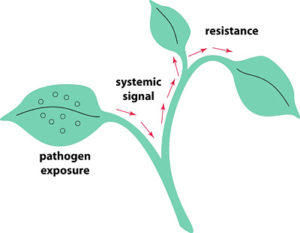Triggering Plants’ Immune Response Provides Protection Against Disease
For nearly a century, plant scientists have known that when a plant survives a disease, it often is more resistant to subsequent infections. It’s as if the plant’s immune system has become stronger, and indeed it has.
 Because they are rooted in the ground, plants appear to be at the mercy of every disease or insect that comes their way. However, plants actually have a number of defense mechanisms. One of these is systemic acquired resistance (SAR), a whole-plant defensive response to disease. When a pathogen invades, a long-distance chemical signal is sent from the infection site that triggers the SAR response.
Because they are rooted in the ground, plants appear to be at the mercy of every disease or insect that comes their way. However, plants actually have a number of defense mechanisms. One of these is systemic acquired resistance (SAR), a whole-plant defensive response to disease. When a pathogen invades, a long-distance chemical signal is sent from the infection site that triggers the SAR response.
While research is still ongoing and many questions remain, it appears that salicylic acid (SA) plays a key role in the long distance signaling, which occurs via the phloem, or nutrient transport system. Scientists believe that infection causes a buildup of SA, which in turn triggers the plant genes specific to the SAR response to produce pathogenesis-related proteins. These proteins, some of which have been proven to have anti-microbial activity, remain within the plant to help protect it from further infection.
It is important to note that not all pathogens elicit the SAR response, and not all plants react in the same way. But it is clear that the SAR response is an important component of plant health. The true potential for agriculture though, lies in developing the ability to elicit this response before the first infection, preventing the initial loss of plants and yield. Plants have been bred for disease resistance for years, and it works, but it’s a process that takes many years. Having the ability to induce a systemic resistance in the current year’s crop by triggering a chemical response within the plant is a powerful tool for growers — one that can be integrated into the crop protection program and may reduce conventional pesticide use.
Chemical elicitors of the SAR response have been discovered. Since the elicitor itself doesn’t have anti-microbial action it has less environmental impact than most conventional pesticides. Studies have been conducted using various elicitors on a number of crops. The efficacy of both the elicitors and the SAR response itself was dependent upon a number of factors including the dose, the plant’s genetics, the frequency of application and the pathogen. In some cases, the SAR response generated was ineffective, but in others it was just as effective as the conventional treatment. In other cases, the response was effective, but the best results were obtained in combination with other crop inputs.
Many KeyPlex products contain proven elicitors that activate the SAR response along with essential micronutrients for plant growth. Combining the nutrients plants need with elicitors that boost the immune system is one way to ensure that crops will grow to their full potential and stay that way.
